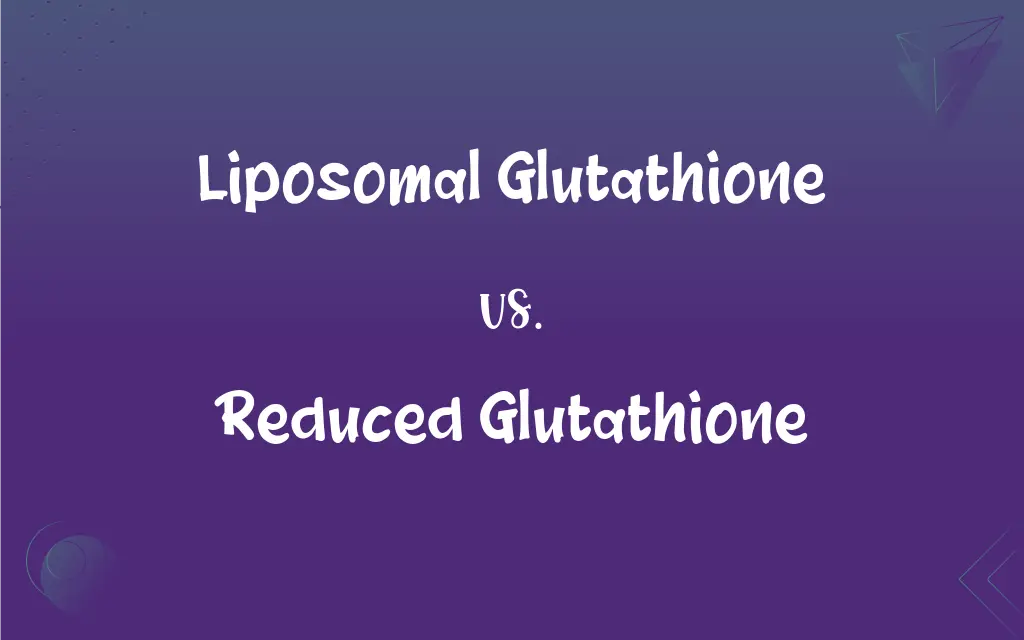Liposomal Glutathione vs. Reduced Glutathione: What's the Difference?
Edited by Aimie Carlson || By Harlon Moss || Published on August 28, 2024
Liposomal glutathione is encapsulated for better absorption, while reduced glutathione is the antioxidant's active, directly usable form.

Key Differences
Liposomal glutathione is a form of glutathione enclosed within liposomes, tiny bubble-like structures made from the same material as cell membranes. This encapsulation aids in the protection and absorption of glutathione through the digestive system. Reduced glutathione, on the other hand, refers to the active form of glutathione, which is a tripeptide molecule playing a crucial role in protecting cells from oxidative stress.
The liposomal form of glutathione is designed to improve the bioavailability of glutathione. This means that when ingested, a higher percentage of glutathione reaches the cells where it's needed. Reduced glutathione, as the active form, is already in the state the body needs for cellular processes, but it faces challenges in absorption and stability when taken orally.
Liposomal glutathione's unique delivery system allows it to bypass the harsh environment of the stomach, reducing the degradation that glutathione typically undergoes. This contrasts with reduced glutathione, which, when taken in non-liposomal forms, may be broken down before it can be effectively absorbed and utilized by the body.
The liposomal encapsulation also potentially reduces the risk of gastrointestinal discomfort, a concern sometimes associated with high doses of standard oral glutathione supplements. Reduced glutathione, while effective in its active form, does not inherently possess this protective encapsulation, which can limit its effectiveness due to breakdown during digestion.
Both liposomal glutathione and reduced glutathione serve the purpose of supplementing the body's antioxidant defenses, their main difference lies in the method of delivery and absorption. Liposomal glutathione offers enhanced absorption and protection against degradation, while reduced glutathione provides the antioxidant in its active form but lacks the advanced delivery system.
ADVERTISEMENT
Comparison Chart
Form
Encapsulated in liposomes
Basic, non-encapsulated form
Absorption
Enhanced due to liposomal encapsulation
Direct, but potentially less efficient without encapsulation
Bioavailability
High, due to protection from digestive enzymes
Lower, can be degraded in the digestive process
Targeted Use
Often used in conditions requiring high bioavailability
Used in general for its antioxidant properties
Cost
Generally more expensive due to complex manufacturing
Typically less expensive
ADVERTISEMENT
Liposomal Glutathione and Reduced Glutathione Definitions
Liposomal Glutathione
Liposomal glutathione is used to enhance cellular uptake of glutathione, an important cellular antioxidant.
Health practitioners suggest liposomal glutathione for its efficient cellular delivery.
Reduced Glutathione
It’s the form of glutathione that directly interacts with free radicals and toxins to neutralize them.
Reduced glutathione is effective in neutralizing various harmful substances in the body.
Liposomal Glutathione
It’s a method of delivering glutathione in a way that protects it from being broken down before it’s absorbed.
Liposomal glutathione is beneficial due to its protective liposomal covering.
Reduced Glutathione
Reduced glutathione is crucial for maintaining cellular redox balance and overall health.
To maintain good health, maintaining optimal levels of reduced glutathione is essential.
Liposomal Glutathione
Liposomal glutathione offers an advanced form of glutathione supplementation, utilizing liposome technology.
For better absorption, many choose liposomal glutathione over other forms.
Reduced Glutathione
This is the most common form of glutathione, involved in detoxification and immune system support.
Taking reduced glutathione supplements can aid in detoxifying the body.
Liposomal Glutathione
Liposomal glutathione is a form of glutathione encapsulated in lipid bilayers for improved absorption.
After starting liposomal glutathione, I noticed an improvement in my overall well-being.
Reduced Glutathione
Reduced glutathione is the biologically active form of glutathione, an antioxidant found in every cell.
Reduced glutathione plays a critical role in protecting cells from oxidative damage.
Liposomal Glutathione
This is a bioavailable form of glutathione, essential for detoxification and antioxidant protection, encased in liposomes.
Liposomal glutathione is often recommended for its superior absorption qualities.
Reduced Glutathione
Reduced glutathione is the active, antioxidant form of glutathione, essential for cellular protection.
Doctors often recommend reduced glutathione for its cellular protective properties.
FAQs
What is liposomal glutathione?
It's a form of glutathione encapsulated in liposomes for better absorption.
How is liposomal glutathione different from reduced glutathione?
Liposomal glutathione is encapsulated for better absorption, whereas reduced glutathione is the active form without encapsulation.
What are the benefits of reduced glutathione?
It aids in detoxification, supports the immune system, and protects against oxidative stress.
Who should take reduced glutathione?
Anyone looking to boost their antioxidant levels and overall health.
Is liposomal glutathione more effective than reduced glutathione?
It can be more effective for certain conditions due to its enhanced absorption.
What are the benefits of liposomal glutathione?
Enhanced absorption, greater bioavailability, and potentially better outcomes for certain health conditions.
How long does it take to see effects from liposomal glutathione?
It varies, but some may notice effects within a few weeks.
What is reduced glutathione?
The biologically active, directly usable form of the antioxidant glutathione.
Can reduced glutathione be taken orally?
Yes, but its absorption can be less efficient compared to the liposomal form.
Who should take liposomal glutathione?
Those seeking enhanced absorption of glutathione, especially for specific health issues.
Are there any side effects of reduced glutathione?
Rarely, it may cause mild side effects like bloating or allergic reactions.
How long does it take to see effects from reduced glutathione?
It can take several weeks to months, depending on individual health status.
Can both forms of glutathione be taken together?
Yes, but consult a healthcare provider for the best approach.
Are there any side effects of liposomal glutathione?
Generally well-tolerated, but some may experience gastrointestinal disturbances.
Can reduced glutathione help with liver function?
Yes, it plays a key role in detoxifying harmful substances in the liver.
How is liposomal glutathione administered?
Usually taken orally in liquid or capsule form.
Can liposomal glutathione improve skin health?
Yes, due to its antioxidant properties, it can improve skin health and appearance.
Can liposomal glutathione help with chronic illnesses?
It may be beneficial in managing certain chronic conditions, but consult a doctor.
Is reduced glutathione good for athletes?
Yes, it can help with recovery and oxidative stress in athletes.
How is reduced glutathione administered?
Available in oral, intravenous, or inhaled forms.
About Author
Written by
Harlon MossHarlon is a seasoned quality moderator and accomplished content writer for Difference Wiki. An alumnus of the prestigious University of California, he earned his degree in Computer Science. Leveraging his academic background, Harlon brings a meticulous and informed perspective to his work, ensuring content accuracy and excellence.
Edited by
Aimie CarlsonAimie Carlson, holding a master's degree in English literature, is a fervent English language enthusiast. She lends her writing talents to Difference Wiki, a prominent website that specializes in comparisons, offering readers insightful analyses that both captivate and inform.






































































